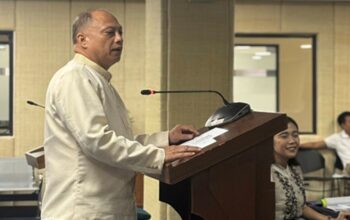
TAGBILARAN CITY, Bohol (PIA) –With the recorded entry of the African Swine Fever (ASF) virus in Pilar Bohol despite the incessant and unwavering campaign to insulate Bohol from the virus, Bohol veterinary authorities have become pragmatic about the next case that comes in.
“With the incursion of the ASF virus in San Vicente Pilar, we see that not everyone is helping. We were just lucky Purok 6 in San Vicente Pilar is a sparse neighborhood, for if it happened in an area where houses are closely knit, we would not have been as lucky,” remarked Dr. Stella Marie Lapiz, Provincial Veterinarian.
Speaking in line with the recent Department of Agriculture’s Bureau of Animal Industry (DA-BAI) iteration that Pilar Bohol remains to be ASF free, Dr. Lapiz noted that government campaign efforts since 2019 have remained useless if the community does not help.
During the middle weeks of July, the Office of the Provincial Veterinarian (OPV) received reports of deaths of pigs in swine-farms in San Vicente Pilar.
Immediately, the OPV sent a team of experts to verify these reports, gather blood samples and initiate depopulation to deny the virus causing the infection of chances to jump into another pig and spread the infection.
In fact, the team immediately identified the first 100 meters from the index cases and designated these as quarantine zone, where they also collected random blood samples from the nearby herd, for laboratory confirmation of the presence of the virus causing the infection.
Then, while setting up foot mats to affected households to control the potential spread of the virus through human carriers and fomites, spray disinfections were also done in 9 small family pig-farms, to kill the virus.
The team, in collaboration with municipal and barangay officials also set up checkpoints to restrict movement of swine and men, as Governor Erico Aristotle Aumentado issued and Executive Order activating the Provincial ASF Task Force treating the viral incursion as ASF, pending the laboratory results.
From the succeeding laboratory tests taken from blood samples collected in pig farms in Purok 6 San Vicente Pilar showed positive for ASF virus, while the samples from the next 100 meters showed negative for infection.
The same negative results came out from random blood samples collected from the next 500 meters from the index case, according to Dr. Lapiz.
Presented with these facts and the need to come up with an updated categorization for ASF affected and safe areas, Dr. Paul Limson, DMV, in a letter to DA Regional Executive Director Angel Enriquez that based on the documents submitted, the reviewed narrative reports and the laboratory results, the DA BAI supports the DA-7 in maintaining Pilar Bohol’s color code as green or ASF Free Zone.
The ASF Free status however is contingent upon the absence of any other confirmed cases in the farm and other nearby barangays within 15 days from the discovery of the first index case.
And as the DA-BAI appreciates the local governments and the DA-7s prompt and effective response to the ASF situation and in adherence to the prescribed national guidelines and regulations, Dr. Lapiz said the next challenge would be where and how Bohol handles the case.
“It is not anymore a question of why and where, but how we handle the next case,” the female veterinarian who has led the OPV and the ASF Task Force into organizing coastal communities to do their share in insulating Bohol from the threat of the virus.
In the region, only Bohol and Siquijor have remained to be ASF Free, since the time Luzon reported the first case of the hog disease in 2019.
ASF is a highly contagious viral disease of domestic and wild pigs, whose mortality rate can reach 100%.
While it poses no danger to human health, ASF has devastating effects on pig populations and the farming economy, a potential threat to Bohol’s P6B hog industry.
According to experts, there has not been any effective vaccine against ASF.
The virus is highly resistant in the environment, it can survive on clothes, boots, wheels, and other materials. It can also survive in various pork products, such as ham, sausages, bacon, or cooked and processed products including chicharon, siomai, and even pork broths.
Because of this, Dr Lapiz stressed that human behaviors can play an important role in spreading this pig disease across borders.
If inadequate measures are taken and people continue to smuggle in pork and its processed products especially from doubtful sources, it may not be long before another viral outbreak happens.
Bohol may be lucky that the first outbreak in Pilar happens in a remote barangay, for if another viral outbreak occurs, for Dr. Lapiz, Bohol may not be as lucky. (PIA-7/Bohol)



